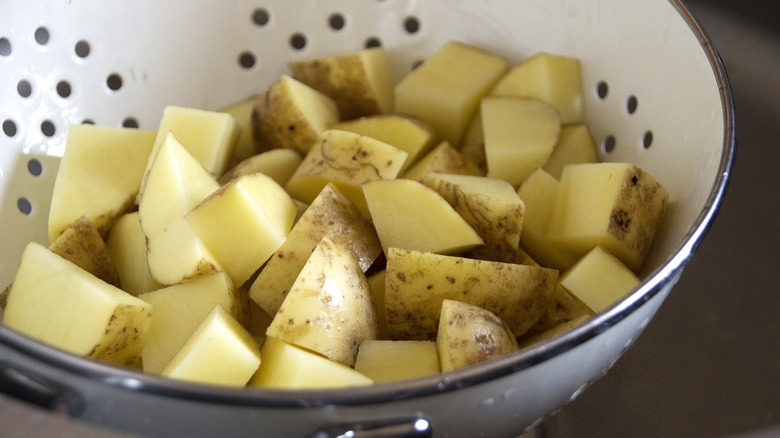If You're In A Pinch, Use A Colander To Easily Make Mashed Potatoes
To get perfectly fluffy mashed potatoes without any lumps or bumps, a potato ricer is the perfect kitchen tool for the job; however, if you do not have one of these gadgets in your culinary arsenal, don't fret. Instead, break out the colander and use it as a substitute. A potato ricer's anatomy is fairly simple and is closer to that of a colander than you may realize. A typical ricer has two long handles attached to a cup-like hopper where a flat, metal plate with holes is placed at the bottom. A boiled potato is placed in this cup where it is forced through the perforated metal plate with an attached plunger mechanism. The riced potato is then mashed until it is smooth and creamy.
When using a colander, you are taking advantage of all the holes that allow the water or liquid to pass through when you wash or strain foods. To transform it into a ricer, simply place it over an empty bowl and push those boiled potatoes through the holes. It definitely takes a little muscle, but you can use a spatula to help the process along if you want to.
Craveable mashed potatoes with the help of your colander
Once you get the hang of using your colander for this task, you will be happy on a couple of different fronts. The first is the fact that if you have limited storage space, you don't have to worry about where to store a bulky ricer. Being able to use a single kitchen tool for multiple tasks ups its usage value.
The second is how velvety smooth your mashed potatoes taste when use your colander as a ricer; however, this hack comes with a caveat. If you are going to use your colander, be sure to let your boiled potatoes cool before you start ricing so any excess water can fully evaporate. If you skip this step, you will end up with a dense mashed potato that doesn't taste quite right. Your motto should be: Patience. Once the steam has stopped rising off of your potatoes, they are generally ready to be riced.

